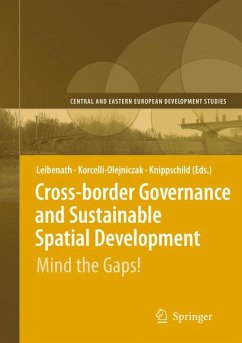Border regions in Central Europe undergo tremendous changes due to the enlargement of the European Union and the related processes of Europeanization, bordering and re-bordering. The book explores the consequences of these processes for cross-border governance and spatial planning in Central Europe. It combines analyses of European and national framework conditions with case studies from border regions and cities in 8 countries. The focus is on generic questions of cross-border planning and cooperation as well as on selected sectors such as nature conservation, transport and economic development. The book is written for the international scientific community and for practitioners in the fields of spatial planning, cross-border cooperation, environmental protection and structural policy.
Dieser Download kann aus rechtlichen Gründen nur mit Rechnungsadresse in A, B, BG, CY, CZ, D, DK, EW, E, FIN, F, GR, HR, H, IRL, I, LT, L, LR, M, NL, PL, P, R, S, SLO, SK ausgeliefert werden.









